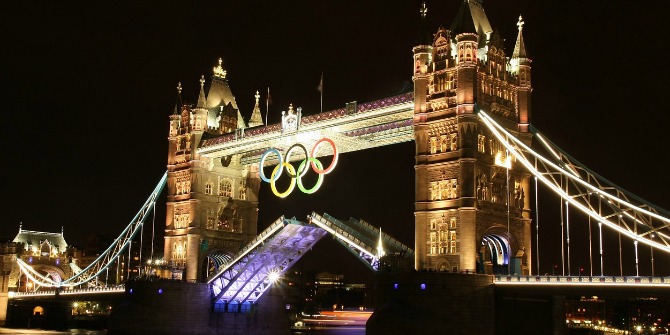 Danny Rye considers Labour’s future after 8 June, if the party does lose the election. He writes that, although much will depend on whether and by how much Labour will increase their vote, Jeremy Corbyn’s leadership continues to provide an opportunity for the re-alignment of the wider British left under the Labour Party’s tent.
Danny Rye considers Labour’s future after 8 June, if the party does lose the election. He writes that, although much will depend on whether and by how much Labour will increase their vote, Jeremy Corbyn’s leadership continues to provide an opportunity for the re-alignment of the wider British left under the Labour Party’s tent.
Until recently, the received wisdom had been that in order to win a general election, Labour had to appeal to a moderate ‘centre ground’. In 2015, Ed Miliband had gambled that the centre of political gravity had shifted to the left. His failure to return Labour to government after one term in opposition was taken as a signal that this was not the case and the party needed to tack back to the right. The subsequent election of Jeremy Corbyn suggested that the party’s electorate disagreed with that analysis. The shifts in the polls in recent weeks, seems to suggest that quite a lot of the UK electorate might too.
As I wrote at the time, Corbyn’s election opened up an opportunity to realign politics on the left. A re-engagement of the Labour mainstream with the broader left would help to reinvigorate and refresh the party’s policies and approach – developing not only new appeals in terms of policy but also new ways of organising, building a stronger presence in communities and reinventing the party for the future. This is arguably dependent on Corbyn being able to do two things: pull off a more leftist version of ‘big tent’ politics, drawing together the left, the centre-left, and the left-behind into a coherent alternative to austerity; and reform the Labour Party structures in such a way as to secure the left’s continued ascendancy.
Corbyn has certainly been successful in drawing the wider left into his tent. However, at present at least, much of this appears to be entirely based on his leadership rather than reflecting any general inclination to support the Labour Party. Were he to step down, it is difficult to see how that broad alliance would hold together. It seems also that some see the survival of Corbyn himself as vital to the whole project of the left in the UK – hence the qualified support he has from groups like the Socialist Worker’s Party and the Socialist Party. The failure of the Corbyn project would thus be a setback for the left more widely.
Corbyn has also undeniably been successful in galvanising new support and reawakening old support that had drifted away from Labour in the 2000s. Despite some suggestion that many of these newer members may be less keen to do the hard graft of party activism, there are reports around the country of greatly expanded participation in meetings and the day-to-day grind that is essential to the functioning of an organised political party. Whilst it is true that a good number of those are thought to be older, returning members, many of them are new and relatively young. This may be an important base from which to build for the future. The key again is how much these newer members are specifically wedded to the Corbyn project rather than the Labour Party itself. If he fails, or falls, will they stay on and engage in the debate about how to go forward?
Where Corbyn has been notably less successful is in persuading the bulk of his parliamentary party of his merits. It was clear from the outset that the vast majority of MPs did not support him. Despite a level of acquiescence by some in the wake of his initial victory, there has been more or less consistent hostility, which broke out most spectacularly in the failed so-called ‘coup’ of 2016. Thus, instead of a debate, what we have had is a long period of stand-off, infighting and distrust, followed then by what can best be described as an uneasy peace, or a kind of sullen hostility. Whilst things have gone remarkably quiet during the General Election campaign, this seems likely to break out into the open again on June 9th. This underlines the division, too, between the Parliamentary Labour Party and the membership, particularly those who have joined or re-joined because of Corbyn. But the membership itself is also divided. In the 2016 leadership contest, Corbyn got a slightly higher per centage of the vote than he did in 2015, but those who were members before May 2015 cast most of their votes for Owen Smith, whilst those who had joined since the general election voted overwhelmingly for Corbyn.
However, there are more serious divisions which animate many of Corbyn’s critics in the PLP: that between the more cosmopolitan, urban Corbyn supporters and ‘traditional’ Labour voters – especially working class voters in the North of England and Wales – who are relatively socially conservative and economically dislocated. Many Labour MPs fear that these ‘left-behind’ voters simply will not vote for the party whilst Corbyn remains leader. But there is at the same time a divide between the pro-European majority of Labour MPs and those very same voters.
For many in the PLP, a trigger for last year’s vote of no confidence and failed leadership challenge (although by no means the only one) was Corbyn’s apparently lacklustre support for the Remain campaign, whilst most voters in key Labour areas overwhelmingly supported Leave. This double whammy of hostility both to Corbyn and Remain-supporting MPs underlines the fear that the Labour Party is in a very deep crisis in areas where support had previously been solid.
In this light, Corbyn’s unwillingness to make an issue of Brexit might be a wise move, but Labour’s electoral challenges do not stop there. On top of this, Labour is making no headway in Scotland, and is already virtually non-existent in most of the South of England. This crisis is not new by any means, but it underlines a conflict about the party’s future, what kind of party it is, and where it should be building its support.
A key aim for the left of the party, and precisely what Corbyn’s opponents would like to prevent, is changes to party rules to their advantage. Much, as ever, will depend on events, specifically the election result and what happens in its immediate aftermath. If he does badly in the election, Corbyn will be under pressure to step down. But, although a bad defeat might on one level make it harder for Corbyn to justify staying in position, it may also ironically make him more secure than before. Analysis by Policy Network found that Labour’s most vulnerable seats tend to be held by Corbyn’s opponents. This means that pro-Coryn MPs will make up a larger proportion of a smaller PLP in the event of a Conservative landslide. In any case, the PLP are unlikely to risk another challenge unless Corbyn voluntarily stands down, since it seems likely that were it to be put to the vote, he would win again.
But if Corbyn does well – and the polls are suggesting he might do much better than anticipated – the converse is true. The snap election meant that there was no time to go through full candidate selection processes and most existing ones were simply readopted. Attempts to install Corbyn supporters were unsuccessful except in the odd case like Walton. So, if Corbyn does as well as the polls now suggest he might, he is likely to face a still largely hostile parliamentary party. A key problem therefore will be what to do about his MPs. Yet, many of the objections that MPs hold come down to a concern about electoral prospects, so perhaps a good result will quieten them for now. At the same time, it will give party moderates a stronger hand within the parliamentary party (if not in the party as a whole), which will be crucial when the time comes to replace Corbyn.
The risk for moderates is that this would give the party’s left room to focus on reshaping the party internally in its own image and gradually change the internal dynamics of the party, and the make up of the PLP. However, despite their numerical support, the key problem for the party’s left up to now has been an organisational weakness which means that the leadership has found itself frequently unable to get its way. Moderate groups like Labour First have been very effective at organising within the party and winning key organisational positions such as the Conference Arrangements Committee which makes key decisions about what gets discussed at party conferences. Thus, even if he stays in position, there is no guarantee that the left will get their desired rule changes and the party will be locked into an ongoing internal war of attrition.
The stalemate seems likely to continue for the time-being. The only chance of change in the moderates’ direction is if enough members change their minds. But, in a lot of local parties there is still enthusiasm for the Corbyn project and, if the party can hold onto its vote or improve it, then it seems likely that members will want to stick with him. A relatively successful campaign may well win over previous sceptics, too. Whether this is enough to secure genuine organisational change and sustain a longer term realignment on the left depends ultimately on the capacity to win over the support (or at least the acquiescence) of the parliamentary party and other internal doubters, at least in the short-term. A measure of electoral success may go some way to achieving that.
_____
 Danny Rye (@dannyrye) is Lecturer in Politics, Liverpool Hope University.
Danny Rye (@dannyrye) is Lecturer in Politics, Liverpool Hope University.









https://you.38degrees.org.uk/petitions/no-to-no-deal-yes-to-best-deal?just_launched=true
Dear Danny
I am one of those undecided voter. I am not worried about NHS as I know we will sort it out with social care within the money currently we are spending and STP, Vanguard, Devomanc and 5 years plan are all our opportunities and India is ready to help in a big-way and in return we can help India as well and both India and UK can grow together and with Brexit we do need any friends we can get and India and UK has old ties and lot of things in common. But new relation must be different one than old master and slave relation!
My main worry is economy and finances of our nation that too post-Brexit! Whoever wins must unite his/her party (this itself is challenge for both the parties and leaders- many are unruly and fight in the open and call themselves as leaders) and then they have to unite the nation! Sad reality is multicultural Britain has uni-cultural leadership that too in Public sector and many private sector! Just look at deprivation index, poverty and ethnicity and that too Muslims, Afro-Caribbeans, Bangladeshis. Look at poverty, homelessness and so on!
Leadership is simple once you know it. It took me 10 years to understand what true leadership is about. I was the Medical Director of Wigan and within 8 years we reduced harm to patients by 90% and we received 45 awards and for staff happiness we were bottom 20% and today 3rd best place to work in the country!
We did it by everyone working together for a common purpose and our purpose is our patients! Everyone matters and every human being matters irrespective of race, gender, ethnicity, class, age and so on.
Our nation is divided and whoever wins the election must bring our nation together, negotiate excellent deal with EU and develop good relation with every nation and build this great nation together!
Leader is a dreamer who never gives up and leaders job is always to do what is right for the most vulnerable people of our society. We can do it by creating kind, caring and compassionate society and with courage to say and do the right thing and we need such a leader!